- Home
- Lionel Shriver
Checker and the Derailleurs Page 3
Checker and the Derailleurs Read online
Page 3
“Some drumming,” said Checker.
“It’s a battle, with these tubs.”
“The drums are supposed to be on your side.”
“These aren’t very responsive.”
“Calf heads are subtle.”
“I don’t think of drums as a subtle instrument.”
“Yes. I can see you don’t.”
Checker smiled slightly, and Eaton felt condescended to. His chin rose in the air. “Antiques, aren’t they?”
“’Forty-eight,” said Check. “A good year.”
“Might consider replacing them. The shells made now are smaller, tighter, sharper. These are muddy.”
“Thanks for the advice. But I’ve had these since I was nine. If I replaced them they’d be hurt.”
“And when you forget their birthday, do they cry?”
“I don’t know,” said Check mildly. “I’ve never forgotten their birthday.”
Check eased into a chair and leaned his neck over the back, closing his eyes. Rahim dipped a napkin into the ice remaining in a drink and wiped across Checker’s forehead. “Sheckair don sleep?”
“Not much, Hijack.” No one asked him where he’d been. No one asked him why he hadn’t slept.
While Check dozed, Rahim cooled the drummer’s neck and patted it dry with the tail of his shirt, rearranged Checker’s collar, and finally stood at attention beside him like a bodyguard, eyeing Eaton occasionally as a potential assassin. The rest of the band quietly packed up and helped the waitress clear drinks. No one talked, but gently the acid dispersed from the room, the heat clanking up from the basement with a fresh burst of steam. Shyly they found each other’s picks and spare strings. Sweeping up, Caldwell decided that fifty dollars wasn’t very much money, after all. J.K. realized that he’d only want to go to Jamaica if he could take Ceil and the kid with him; that people who counted on you were burdens or assets, all depending on how you looked at them. Carl helped wash the dishes and noticed how the waitress managed to talk to him in a way that didn’t demand he answer back, but still made him feel like part of a conversation. Wisps of childhood memories were still trailing through his mind, but he also recalled some other classmates—the girl with buck teeth, the little boy who smelled bad—who were tormented along with him. When he smiled at the waitress while she dried, she blushed.
Howard felt liked. Rahim felt American. Rachel felt sad, but Rachel always felt sad. And in the quiet, steamy closure of the dark club, surrounded by the sound of Checker’s breathing and the hollow expansion and contraction of the pipes below, Eaton Striker had to leave.
As Rahim walked him home Checker wheeled his bicycle between them, the clicking of the back hub ticking off the moments in precise, perfect points like the stars overhead, bright from cold.
Checker said, “I want to show you something.”
They detoured to a run-down industrial block of Astoria Boulevard. The sidewalk shook under their feet as they approached the building, whose sign said VESUVIUS, nothing more. Directly in front, they heard a dull ominous roar. Checker put his hands gently on the front door, like cracking a safe; it trembled under his fingertips. Putting his finger to his lips, he led Rahim down an alley and pointed to a small window. Rahim climbed a trash can to see.
The pane buzzed in its frame; the glass tickled his hand. Here the sound was louder, huge and ceaseless, like a lion that never inhaled. Through the muddy window Rahim could see dimly inside, though he didn’t understand what he was looking at. Fire framed a square of black like an eclipse. As he watched, the black square moved to the side, and a long stick plunged into pulsing vermilion.
Lit only by this hellish glow, an unearthly woman pulled the rod from the fire. She was tall, which always unnerved Rahim in women. She wore a long industrial apron and dark glasses that flashed yellow when they caught the light. Her hair was tied back carelessly, but most of it was escaping. Cut jaggedly in different lengths, it was the hair that made this figure so amazing. Thick and wild, it raged from her head like black flames. Rahim felt he was witnessing some satanic worship service, with a lean, terrible shaman prodding a dangerous god.
While he told himself she was only a woman, Rahim felt even at first glance that this one demanded a whole other word. Trying to rub the window cleaner, Rahim stood up on his toes and took a step closer; his foot missed and he tumbled off the can. The barrel itself fell and made a terrific crash, for it seems the whole container was filled to the brim with bits of broken glass.
Checker laughed softly and helped him up. Together they began to throw the glass back in the barrel.
“Sh-sh!” said Checker, still laughing, when Rahim tossed a piece in the can and it smashed loudly hitting bottom. It was hard to see, and grasping for hunks in the dark Check exclaimed, “Jesus!” and pulled back. Rahim didn’t have a chance to ask what had happened before he looked up to find a molten glob pointed menacingly at him on the end of a metal pole.
“Move and you’re fried,” said a voice. “A minute ago this lump was twenty-four hundred degrees. It may be cooling fast, but it’s still hot enough to turn your face into a pork chop.”
Rahim froze, crouching; Checker, despite the warning, stood up.
The woman pointed a flashlight at Checker like a second weapon.
“What is that?” asked Checker, not sounding very frightened. “It’s fantastic!”
All three of them turned to the glob, changing quickly from a rich yellow to a duller, more smoldering red. As Checker reached toward it, the woman jerked it away.
“Hot glass, toddler. And what have you done to your hand?”
In the beam of the flashlight was a second red glob, on the end of Checker’s arm. There was a quiet, regular patter-patter; the woman trained the light on the ground, where Checker’s blood was spattering onto the chunks of clear glass. The glass sparkled, and the red drops bounced and drizzled over its crystals like expensive rain. Strange. It was beautiful.
“Sheckair!” Quickly Rahim shed his jacket and tore off his shirt, and began to wrap Check’s hand.
“Don’t use your dirty shirt,” she said sharply. “I have medical supplies inside. I suppose you can come in.” She led them reluctantly in the door and smashed the rod against the cement floor. The glass, now black, cracked off; she tossed the rod in a barrel and went to get first aid. “Christ,” Check heard her mutter on the way, “I start to run off hoodlums and end up playing Sara Barton.”
“That’s Clara Barton,” he shouted after her. Unexpectedly, she laughed.
Checker didn’t seem very concerned with his hand, more delighted to have weaseled his way in here. He and Rahim approached the furnace. Inside, the roar was deeper, striking a broader range of tones. Checker couldn’t take his eyes off the fire though at a certain point he stood back from the heat. In fact, the whole room was sweltering, and recalled the febrile interior of Plato’s Bar.
When she returned she switched on a light, to Rahim’s disappointment—it ruined the satanic religiosity of the scene. As she rinsed out Checker’s cut in warm water over her sink, they both stared at the glassblower, not quite as mysterious without the glow of the furnace, but no less intimidating.
Everything about her was long: her neck, her waist, her face. Her cheeks were hollow and drawn; her expressions were conducted in the narrow range between amusement and irritation. As she tended his hand, her face sharpened in an intentness that seemed usual. Her oversized green shirt billowed under her apron with accidental style. Her jeans shone with dirt. The musty smell wafting from them suggested she’d been in these clothes for a while.
“You’re filthy,” Check observed joyously as his blood ran in diluted swirls down the drain.
“You’re stupid,” she shot back. “Why were you and your friend crawling around in a pile of broken glass at four in the morning?”
“Watching you,” said Check. As she went for the antiseptic, he followed her hands. They looked older than the rest of her—fiftyish, sixtyish even
—scarred and craggy, with abused nails. Her fingers were long like Caldwell’s, but ancient and knuckly. They tended his cut with care but authority, like a good mechanic’s.
“What are all these little scars?” she asked about his own hand, which was covered in small white lumps.
“From drumming.”
A look. “Violent.”
“Passionate.”
She laughed.
“Why is that funny?”
“Well, how old are you?”
“What does that have to do with passion?”
“Maybe nothing,” she admitted.
Her motions were jagged, like her hair. When she turned to find the gauze, a peak of hair touched his face; Checker reached up as if to brush it away, but really to feel it—a little coarse; he noticed a few strands of gray.
“How old are you?”
“Why?”
“Cause I can usually tell. You, I can’t place within ten years.”
“Twenty-nine.”
“I’d have guessed older.”
“Real diplomatic.”
“You’re not insulted.”
She stopped wrapping his hand and looked at Check as if seeing him for the first time. She seemed surprised by what she saw. “No?”
“It doesn’t matter to you, looking young,” Check explained. “Just now—I think you were flattered.”
The woman sucked in her cheeks and shot him a sour, bemused little smile. “Maybe.”
“You must finish wrap.”
This whole time Rahim had been following the medical process suspiciously, examining the label on the antiseptic; when she stopped working on the bandage Rahim couldn’t contain himself.
“What?”
“Wrap,” said Rahim staunchly.
“You spy on my work and knock over a whole barrel of cullet and I still take you in to patch up your bloody bungling and I don’t do it fast enough. So sorry.”
“’Sokay,” said Rahim, who had no sense of American sarcasm. “Just finish quickly, please. Sheckair vedy tired. I take him home now.”
“Well, I’m a little tired myself,” she said with genuine annoyance. Disappointed, Checker watched her tie up his hand summarily and stand, hands on her hips. She was taller than both of them.
“Come.” Rahim took Checker’s good hand and began to pull him toward the door. The Iraqi had his proprietary side, like a severe, overly protective secretary.
Check dragged. “Can I come back?”
“What for?”
“The glass. I want to watch.”
“You’ve been watching.”
“Tomorrow!” At last Rahim succeeded in hauling Checker out the door, but not before he’d gotten one last glimpse of the glassblower, who was looking at him, he thought, terrifically hard. She had the same drastic features as Caldwell Sweets, and she certainly did look older than twenty-nine, but Checker, who had a lot of experience with looking at people right, knew full well that she was gorgeous.
3 / Bad Company
Astoria Park is bordered by two bridges—on its northern end by a lumbering rusted railroad bridge called Hell Gate, named for the dangerous eddies that churn below its girders. Several workers lost their lives in its construction; gruff and awkward, Hell Gate would have bid them farewell without ceremony. It has the terse, groggy, and potentially violent character of heavy drinkers; accessible only by the desperate clambering of lonely adolescents, it isn’t a trellis to which you’d ordinarily appeal. Still, Hell Gate is comforting in its way, quiet, protective, and steady. Whenever it rained, the band huddled under its belly, leaning up against the rough concrete abutments to smoke.
The Triborough, on the southern end, is an entirely different animal. Constructed in 1936, she’s young, for a bridge. While Hell Gate arches downward, the Triborough is a classic suspension span, with the grace and desire of a cathedral. Unlike the craggy umber of her senior upriver, the Triborough is painted a soft blue-gray; while even more enormous, she never gives the impression of weight. From that vain sally over the river, the swoop and cinch of her waist, Checker had detected her feminine nature, but she still seemed to have a boyish sense of fun. Riding the powerful rise and fall of her pedestrian ramps, he could tell she was athletic, well-toned.
Checker had respect for Hell Gate; he was glad the old man was there, and did sometimes consult the older bridge on difficult and purely masculine matters, but his heart belonged to the Triborough. In spring he bounded across her walkways in new tennis shoes; in winter, Checker and his bicycle, Zefal, scrumpled fresh squeaky tracks in her snow.
While the two bridges embrace all of Astoria Park, a lush, well-populated recreation area old as the neighborhood itself, another finger of public land extends north of Hell Gate called Ralph DeMarco, recently developed with the help of nearby Con Edison to spruce up the rather bleak city projects across the street. Like so many good deeds, Ralph DeMarco has an overplanned, overdeliberate quality that defeats it. Ralph DeMarco is a failed park. It has no intermediate vegetation, for example—only very short grass and whole young trees, sunk in lifelessly regular rows. The trees themselves are pretty but too exotic—willows, cherries, and beeches; foreigners like the Indians who live here, they don’t fit in. Benches are set in optimistic semicircles, as if to encourage the kind of warm community closeness no one here feels—unwed mothers sit facing each other blankly, not talking. The railings by the river are painted a shocking shade of plum, a color some commission must have hoped would be brightening but which ended up simply peculiar.
Lately Astoria Park was thriving, overcrowded in summer, but Ralph DeMarco was nearly deserted even when it was warm, and Checker felt sorry for it. Ralph DeMarco was hanging on by a thread. He sometimes took the band here evenings just to cheer it up. The little park broke Checker’s heart. It tried too hard. It reminded him of Howard.
Besides, the relative quiet of the place had advantages, like the time last summer Danno’s Late Show was playing a Perfect Album Side from Talking Heads’ “Speaking in Tongues.” Caldwell never tired of telling the story, because that night a Corvette braved the terrifying void of the land from Con Ed and parked right in front of The Derailleurs’ ghetto blaster, challenging the Heads with loud, ill-tuned Judas Priest.
Checker had approached the man in leather leaning against the hood. “Can’t you get NEW in that car?”
“Can. Won’t. Gotta problem?”
“Actually, yes,” said Checker, with that disconcerting innocence of his that made the rest of the band’s skin crawl; for once it was apparent that Check was small. Still, he stared up at the tough with his odd Sicilian-blue eyes. “I’d appreciate it if you’d either tune into the same station or park a block or two away. They’re coming up on my favorite song.”
“And this lunk,” Caldwell would recall later, “some Hulk or Bubba or Crusher, cracks his Bud with his teeth. I don’t give a livin fuck, suck-ah. Howard here is creaming. Old J. de K. is rolling up his sleeves, so for once we’re glad the man’s had a few too many pancakes. Q.C. starts getting that Chinee squint, like maybe he’s studied karate, though all us knowing good and well Carl hasn’t even studied algebra. Rache gets this High Noon look, with hair everywhere…All the while the Heads bouncing through ‘This Must Be the Place,’ the Priest screaming, I don’t know, Hate-your-sister-smush-your-mother-kill-the-whole-world—you’ve heard their stuff. It was tense, boy. Crusher, he steps forward from the ’vette. Check, he’s had his hands behind his back the whole time, okay? And he doesn’t step back. He smiles this tiny don’t-fuck-with-me smile. The tunes, they break at exactly the same time. And for two, three seconds there’s total silence, even the wind stops. In the break, behind Check’s back, there’s a click. Oh, God. You know that sound, man. That little blade sound, and that is it, man, that is the end of the old hangout-in-the-park-one-more-summer-night kind of thing and into this, oh shit—
“Or that’s what Crusher figures, anyway, and you can see his face twist up and he reaches
inside his jacket and—”
J.K. always starts laughing here.
“Shut up, man, you’ll ruin the story!”
“I heard the story a hundred time, Sweets—”
“They haven’t heard it! So don’t—”
“It a umbrella.”
“What?” asks the new audience.
J. K. keeps laughing. “The snap! Check don’t have no blade, man! It one of these portable suckers, see—”
“Shut up, J.K., it’s my story—”
“Everybody story, longhair. Real small and real sweet. Jus like a candy, that night a little candy night.”
It was, small and perfect, it lay on your tongue. That’s what nights with Checker were like. Before the man in leather had reached all the way into his pocket Checker brought the little umbrella out front and propped it pleasantly on his shoulder. “They say,” he said, “it might rain.”
His hand still in his jacket, the man released a single, unintentional guffaw.
It’s funny how people will deal with you on the level you choose for them. Suddenly everything got very subtle. The smiles. The shifts of stance. The eye contact, the looking away. “Okay, Fred Astaire,” said Crusher. “Hey, Bilgewater,” he said to the man in the passenger’s seat. “NEW.—Just for a while.” Then he raised his beer with a weird sort of—suavity. The whole thing became an excruciating, delicate joke. Checker twirled the parasol gaily on his shoulder.
Checker tried to explain later: it’s easier to change the station. All most Crushers need is a look in two blue eyes that say: The river is rushing black and furious tonight, the wind is whipping at the cherry trees and sweeping the branches of the willow like Rachel’s High Noon hair; it will rain later, lashing the rocks and bottles below us—you see, there are enough battles already. Instead, take the lights of the Triborough bright in my eyes, feel the cut of the air before a storm, try my station and roll onto the balls of your feet, coiling your calves and rippling the tops of your thighs. Keep the fight in your body. Besides, said the eyes, there is so much else to do—let me introduce you to the miracle of your neighborhood. This is Ralph DeMarco.

 Ordinary Decent Criminals
Ordinary Decent Criminals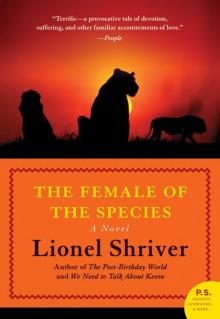 The Female of the Species
The Female of the Species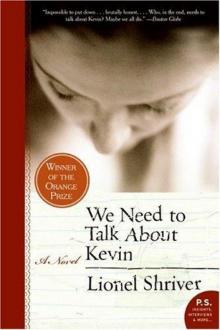 We Need to Talk About Kevin
We Need to Talk About Kevin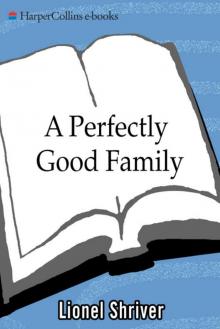 A Perfectly Good Family
A Perfectly Good Family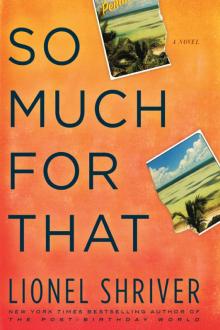 So Much for That
So Much for That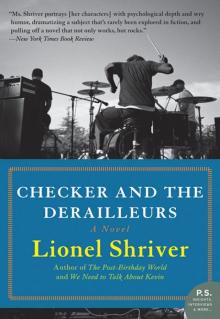 Checker and the Derailleurs
Checker and the Derailleurs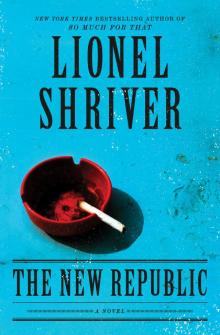 The New Republic
The New Republic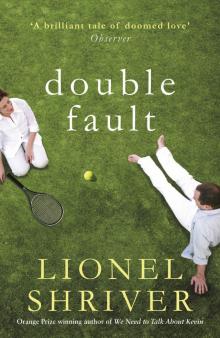 Double Fault
Double Fault Should We Stay or Should We Go
Should We Stay or Should We Go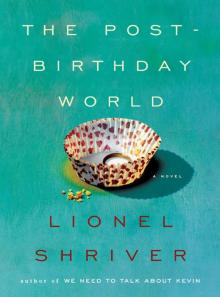 The Post-Birthday World
The Post-Birthday World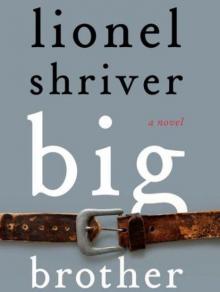 Big Brother
Big Brother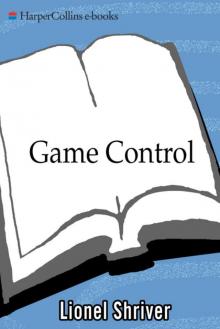 Game Control
Game Control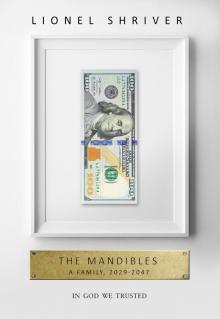 The Mandibles
The Mandibles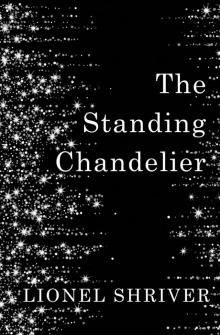 The Standing Chandelier
The Standing Chandelier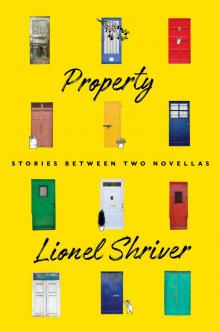 Property
Property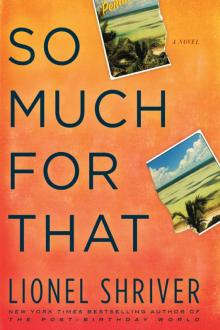 So Much for That: A Novel
So Much for That: A Novel